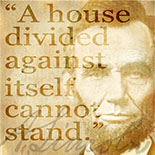 The House Divided Speech was an address given by Abraham Lincoln (who would later become President of the United States) on June 16, 1858, at what was then the Illinois State Capitol in Springfield, upon accepting the Illinois Republican Party’s nomination as that state’s United States senator. The speech became the launching point for his unsuccessful campaign for the Senate seat held by Stephen A. Douglas; this campaign would climax with the Lincoln-Douglas debates of 1858.
The House Divided Speech was an address given by Abraham Lincoln (who would later become President of the United States) on June 16, 1858, at what was then the Illinois State Capitol in Springfield, upon accepting the Illinois Republican Party’s nomination as that state’s United States senator. The speech became the launching point for his unsuccessful campaign for the Senate seat held by Stephen A. Douglas; this campaign would climax with the Lincoln-Douglas debates of 1858.
Mr. Lincoln’s remarks in Springfield created an image of the danger of slavery-based disunion, and it rallied Republicans across the North. Along with the Gettysburg Address and his second inaugural address, this became one of the best-known speeches of his career.
The best-known passage of the speech is:
A house divided against itself cannot stand. I believe this government cannot endure, permanently, half slave and half free. I do not expect the Union to be dissolved — I do not expect the house to fall — but I do expect it will cease to be divided. It will become all one thing or all the other. Either the opponents of slavery will arrest the further spread of it, and place it where the public mind shall rest in the belief that it is in the course of ultimate extinction; or its advocates will push it forward, till it shall become lawful in all the States, old as well as new — North as well as South.
Lincoln’s goals with this speech were, firstly, to differentiate himself from Douglas, the incumbent; and secondly, to publicly voice a prophecy for the future. Douglas had long advocated popular sovereignty, under which the settlers in each new territory decided their own status as a slave or free state; he had repeatedly asserted that the proper application of popular sovereignty would end slavery-induced conflict, and would allow northern and southern states to resume their peaceful coexistence. Lincoln, however, responded that the Dred Scott decision had closed the door on Douglas’s preferred option and left the Union with only two remaining outcomes: the United States would inevitably become either all slave, or all free. Now that the North and the South had come to hold distinct opinions in the question of slavery, and now that this issue had come to permeate every other political question, the time would soon come when the Union would no longer be able to function.